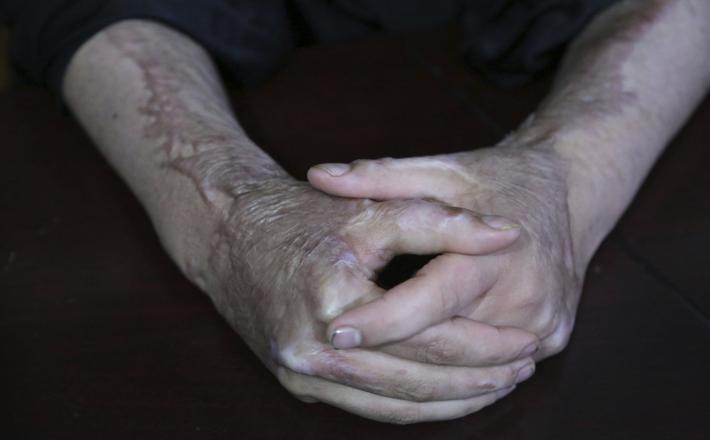Afghan women demand seat at peace talks but face resistance
Source: Associated Press
HERAT, Afghanistan (AP) — For four hours, Khadeja begged her in-laws to take her to the hospital. The skin on her face and neck was peeling. The pain was excruciating. Her husband had thrown a pot of scalding water on her face and upper body.
Her head was bowed and sobs convulsed her body as she remembered the moment. “The pain . . . I can’t say how much I hurt.”
She eventually received treatment, but scar tissue on her neck makes breathing difficult and her hands are misshapen. Her husband — a man she was forced to marry at 16 by her father — was never held accountable. Such impunity for violence against women remains pervasive in Afghanistan.
The suffering of young women like Khadeja is why women rights activists say they are demanding a seat at the table in negotiations between the government and the Taliban over peace and Afghanistan’s future.
(…) A survey released in January said only 15 percent of 2,000 men polled believed women should be allowed to work outside the home after marriage and two-thirds said women already had too many rights. The survey was conducted by U.N. Women and Promundo, a group promoting gender justice.
Click here to read the full article published by Associated Press on 28 April 2019.

HERAT, Afghanistan (AP) — For four hours, Khadeja begged her in-laws to take her to the hospital. The skin on her face and neck was peeling. The pain was excruciating. Her husband had thrown a pot of scalding water on her face and upper body.
Her head was bowed and sobs convulsed her body as she remembered the moment. “The pain . . . I can’t say how much I hurt.”
She eventually received treatment, but scar tissue on her neck makes breathing difficult and her hands are misshapen. Her husband — a man she was forced to marry at 16 by her father — was never held accountable. Such impunity for violence against women remains pervasive in Afghanistan.
The suffering of young women like Khadeja is why women rights activists say they are demanding a seat at the table in negotiations between the government and the Taliban over peace and Afghanistan’s future.
(…) A survey released in January said only 15 percent of 2,000 men polled believed women should be allowed to work outside the home after marriage and two-thirds said women already had too many rights. The survey was conducted by U.N. Women and Promundo, a group promoting gender justice.
Click here to read the full article published by Associated Press on 28 April 2019.